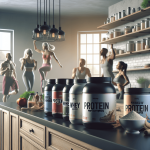Introduction
Protein is essential in your diet. It supports muscle health and helps manage weight. Foods rich in protein are crucial for repairing and growing muscles, as well as keeping your metabolism healthy. These foods not only keep you feeling full for a longer time but also provide steady energy throughout the day.
Including high-protein foods in your meals has many benefits for your overall health. They can help your muscles recover after exercise, boost your immune system, and improve the health of your skin and hair. There are many different types of high-protein foods available, such as eggs and lean beef, which can be used in various ways.
Key takeaway: Adding these high-protein foods to your diet can greatly impact your fitness goals and help you maintain a balanced diet.
What Makes a Food High in Protein?
High-protein foods are those that provide a substantial amount of protein per serving, aiding in meeting your daily dietary needs. Typically, these foods contain at least 10 grams of protein per serving, but many high-protein options offer significantly more.
Protein content is crucial for muscle repair, growth, and overall health. Essential amino acids found in protein-rich foods are vital since the body cannot synthesize them on its own. These amino acids support various physiological functions such as:
- Muscle tissue repair and growth
- Hormone production
- Immune system function
Foods rich in protein often come from both animal and plant sources. Animal-based proteins, like eggs, lean beef, and seafood, generally provide all nine essential amino acids required by the body. Plant-based proteins, such as lentils and tofu, can also contribute significantly to your protein intake but may require combining different sources to ensure you get a complete amino acid profile.
Key points to consider:
- Animal-based proteins: Complete proteins with all essential amino acids.
- Plant-based proteins: May need combining to meet all amino acid requirements.
Incorporating a variety of high-protein foods into your diet ensures you meet your nutritional requirements while supporting muscle health and other bodily functions effectively.
Top 10 High-Protein Foods to Supercharge Your Diet
1. Eggs
Eggs are a powerhouse in the high-protein foods list, offering about 6 grams of protein per egg. This makes them an excellent choice to supercharge your diet with protein-rich foods.
Versatility in cooking is one of the standout features of eggs. Whether you prefer them scrambled, boiled, poached, or baked in a frittata, they can seamlessly fit into various dishes and meal plans.
Nutritional benefits extend beyond protein. Eggs are loaded with essential vitamins and minerals that support overall health:
- Vitamin A: Vital for vision and immune function.
- Vitamin B-12: Crucial for red blood cell formation and neurological function.
- Iron: Supports oxygen transport and energy production.
- Selenium: An antioxidant that helps protect cells from damage.
Including eggs in your daily meals not only boosts your protein intake but also provides a broad spectrum of nutrients essential for maintaining good health.
2. Greek Yogurt
Greek yogurt is a standout on the high-protein foods list because it contains twice as much protein as regular yogurt. While a typical serving of regular yogurt has about 5 grams of protein, Greek yogurt can have 10 grams or more per serving. This makes it a perfect choice for those who want to supercharge their diet with protein-rich foods.
Health Benefits
- Improved Digestion: Greek yogurt is full of probiotics, which are beneficial bacteria that promote gut health.
- Muscle Recovery: The high protein content helps repair and recover muscles, making it an excellent snack after a workout.
Adding Greek yogurt to your meals not only increases your protein intake but also provides important nutrients like calcium and vitamin B-12, which are essential for overall health.
3. Cottage Cheese
Cottage cheese is a standout high-protein food with an impressive 14 grams of protein per half-cup serving. This makes it an excellent option for those looking to boost their diet with protein-rich foods. In addition to protein, it also provides essential nutrients like calcium and B vitamins.
Incorporating cottage cheese into your daily diet is simple and versatile:
- Smoothies: Blend it into your smoothies for a creamy texture and protein boost.
- Salad Topping: Use it as a topping for salads to add a rich, creamy element.
- Snacks: Enjoy it on its own or with fruit for a quick, nutritious snack.
Adding cottage cheese to your high-protein foods list can help you meet your daily protein needs effortlessly.
4. Lean Beef
Lean beef stands out on the high-protein foods list thanks to its substantial protein content—approximately 30 grams per serving. This makes it one of the best sources of complete protein available, ideal for those looking to supercharge their diet with protein-rich foods.
Nutritional Profile:
- Low-Fat Content: Lean beef offers a hearty dose of protein without excessive fat, making it a healthy option for muscle building and weight management.
- Essential Vitamins and Minerals: Rich in iron and zinc, lean beef supports immune function and energy production. Iron aids in oxygen transport within the body, while zinc contributes to wound healing and DNA synthesis.
Incorporating lean beef into your meals can provide high-quality protein essential for muscle health and overall well-being. Consider adding it to salads, stir-fries, or enjoying it as a standalone dish to reap these nutritional benefits.
5. Chicken Breast
Chicken breast stands out on the high-protein foods list due to its versatility and affordability compared to other meats. With around 31 grams of protein per 3-ounce serving, it’s a powerhouse for anyone looking to supercharge their diet with protein-rich foods.
Various Cooking Methods:
- Grilling: Retains juiciness while keeping calorie count low.
- Baking: Another healthy method that preserves its nutritional value.
- Poaching: Ensures tenderness without adding extra fat.
Chicken breast is a low-fat protein source, making it a staple for those aiming to maintain a balanced diet. Whether used in salads, stir-fries, or sandwiches, its adaptability makes it an excellent choice for meal planning.
Including chicken breast in your meals can help you boost your protein intake effectively, supporting muscle health and weight management.
6. Milk
Milk is a staple beverage that offers about 8 grams of protein per cup, making it an excellent addition to your high-protein foods list. It’s an easy way to supercharge your diet with protein-rich foods.
Whole Milk vs. Skimmed Milk
- Whole Milk: Contains higher fat content but keeps the same level of protein.
- Skimmed Milk: Lower in fat while maintaining similar protein levels as whole milk.
Both varieties provide essential nutrients like calcium and Vitamin D, which support bone health. Whether you prefer whole or skimmed, milk remains a versatile and nutritious choice for boosting your protein intake effectively.
7. Lentils
Lentils are a powerful plant-based protein source, providing about 18 grams of protein per cooked cup. They not only help supercharge your diet with protein-rich foods but also offer additional nutritional benefits like fiber, which aids in digestive health.
Different types of lentils include:
- Red Lentils: Quick-cooking and ideal for soups and stews, typically taking about 15-20 minutes to cook.
- Green Lentils: Firmer texture, great for salads and side dishes, requiring around 30-40 minutes of cooking time.
Incorporating lentils into your meals can significantly boost your protein intake effectively. This addition to our high-protein foods list ensures you have versatile options for both main courses and side dishes.
8. Peanut Butter
Peanut butter stands out on the high-protein foods list with 8 grams of protein per two tablespoons serving. This delicious spread not only provides a quick protein boost but also contains healthy fats that keep you feeling satisfied and energized.
Nutritional Insights
- Protein Content: 8 grams per two tablespoons
- Healthy Fats: Monounsaturated and polyunsaturated fats support heart health
- Other Benefits: Rich in vitamins like E and B6, magnesium, and potassium
Incorporating Peanut Butter into Your Diet
To supercharge your diet with protein-rich foods, consider these simple ways to include peanut butter:
- Breakfast Boost: Spread on whole-grain toast or mix into oatmeal.
- Smoothie Add-On: Blend into smoothies for extra protein and creaminess.
- Snack Time: Pair with apple slices or celery sticks for a balanced snack.
- Baking Substitute: Use as an ingredient in protein bars or energy balls.
Moderation is key to avoid excess calorie and sugar intake while enjoying the nutritional benefits of peanut butter.
9. Seafood
Seafood is a top choice for high-protein foods because it offers two great benefits: plenty of protein and heart-healthy omega-3 fatty acids. These healthy fats are important for maintaining a healthy heart, making seafood an excellent option when you want to boost your diet with protein-rich foods.
Some standout options include:
- Salmon: Provides around 22 grams of protein per 3-ounce serving, along with omega-3s that promote brain and heart health.
- Tuna Steaks: Offer approximately 24 grams of protein per 3-ounce portion, making them an excellent protein source for various dishes.
- Shrimp: Delivers about 20 grams of protein per 3-ounce serving while being low in calories.
These seafood varieties are versatile and can be used in various cuisines at home. Whether you prefer grilling, baking, or adding them to salads, seafood can play a significant role in maintaining a balanced diet.
Including seafood in your meals not only increases your protein intake but also provides essential nutrients like B12 and selenium. These nutrients are vital for muscle mass and overall well-being.
10. Tofu
Tofu stands out on the high-protein foods list with its ability to supercharge your diet with protein-rich options. This plant-based protein source delivers approximately 8 grams of protein per 3-ounce serving, making it a staple for vegetarians and vegans.
Tofu Nutrition Facts:
- Firm Tofu: Around 10 grams of protein per half-cup
- Silken Tofu: Approximately 4 grams of protein per half-cup
- Extra Firm Tofu: About 15 grams of protein per half-cup
Its versatility allows it to be used across various cuisines, from stir-fries to smoothies.
Pro Tip: Marinate tofu to enhance its flavor, or blend it into sauces for a creamy texture without the extra calories. Including tofu in your meals not only boosts your protein intake but also provides essential amino acids beneficial for muscle health.



